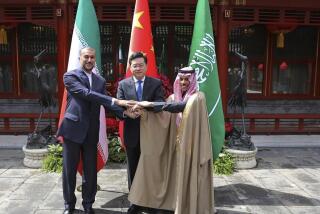S. Korea, China Agree to Set Up Trade Offices : Asia: The diplomatic accord is another setback for Communist North Korea, an ally of Beijing.
- Share via
SEOUL — South Korea and China, a major ally of North Korea, agreed Saturday to set up trade offices in each other’s capitals that will also have the diplomatic function of issuing travel visas.
Coming three weeks after Seoul established diplomatic relations with the Soviet Union, Communist North Korea’s other major ally, Saturday’s development represented another setback for the Pyongyang regime in its efforts to keep its socialist friends from developing close relations with Seoul.
The announcement, made simultaneously in Beijing and Seoul, came after nearly two years of negotiations.
Since 1988, all Eastern European countries except Albania have established diplomatic relations with South Korea. Each move in turn was condemned by Pyongyang, which branded Moscow’s Sept. 30 recognition of Seoul as “treachery.”
Although South Korea failed to persuade China to assign the offices “official” government status, the Chinese accepted Seoul’s bid to allow them to perform certain consular duties, including the issuance of visas. Beijing also agreed that the offices will be established at a national level, not in specified provincial capitals, as China had proposed when negotiations began in 1988.
The agreement was signed in Beijing by Zheng Hongye, chairman of the China Council for the Promotion of International Trade, and Lee Sun Ki, president of KOTRA, the Korea Trade Promotion Corp. Both organizations are operated directly by their respective governments.
The offices, which are expected to open in late November, will bear the names of the two organizations, not the names of the two countries, however.
Park Ho Tack, KOTRA’s senior vice president, who announced the agreement in Seoul, said 20 people, including government officials, will be permitted to staff each office and issue visas. South Korea’s Foreign Ministry and the Ministry of Trade and Industry are both expected to assign officials to the office.
The offices are expected to function as de facto embassies, providing a contact point for discussions on aviation and commercial accords and an investment protection agreement. Their principal functions, the joint announcement said, will be to promote trade and exchanges of science and technology.
The Foreign Ministry here issued a statement saying it hopes “the offices will make a major contribution to normalizing relations between the two countries.”
“In terms of economic exchange and trade, the Chinese no longer feel any restraint because of North Korea” in dealing with Seoul, Lee Ki Joo, an assistant vice foreign minister, said in an interview. China, however, remains “emotionally and mentally” committed to support of North Korea in diplomatic terms, he added.
“After the Tian An Men (Square) incident, the Chinese may feel they are in the same boat with the North Koreans in terms of perestroika (political and economic restructuring),” Lee said.
Trade between China and South Korea reached $3.1 billion last year and, through July this year, amounted to $1.9 billion. At the end of 1989, South Korea was China’s eighth-largest trading partner while China was South Korea’s fourth-largest.
“Despite the aftermath of the Tian An Men incident, trade this year will at least be more than last year,” Lee said. KOTRA officials predicted that two-way trade could reach $3.5 billion next year.
Expansion of trade, however, “depends upon purchasing power on the Chinese side. They have a problem in a shortage of foreign exchange,” Lee said.
Lee predicted that the new offices also will facilitate a rapidly expanding flow of visitors between the two countries, which were enemies in the 1950-53 Korean War when China intervened to prevent a North Korean defeat.
Exchanges of 23,000 visitors both ways in 1989 already had been exceeded by a two-way exchange of 27,000 people through July this year, with 14,700 of them Chinese coming to South Korea, Lee said.
Despite the lack of investment guarantees and the absence of an agreement to prevent double taxation, South Koreans have already committed $124 million to 67 investment projects in China.
More to Read
Sign up for Essential California
The most important California stories and recommendations in your inbox every morning.
You may occasionally receive promotional content from the Los Angeles Times.









